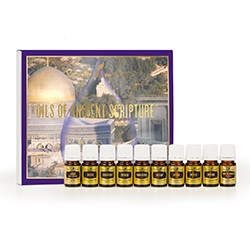This week we are hosting an Oils Of Ancient Scripture Class.
On Monday, April 13 we are mailing out the Sample Kits to those who have ordered them
(we still have a couple of them left if you are interested ~ contact me for pricing)

Aloes (Sacred Sandalwood): Believed to be made from fragrant sandalwood, aloes were a gift Nicodemus brought to Jesus. (John 19:39)
Cassia: Cassia was a key ingredient in the incense used in temple worship. (Psalms 45:8)
Cedarwood: The “cedars of Lebanon” were acclaimed for their durability and used to build Solomon’s famous temple. (1 Kings 4:33)
Cypress: This oil is extracted from the cypress tree, which has wood so durable that the cypress doors of Rome’s St. Peter’s Basilica show no sign of decay even after 1,200 years. (Isaiah 44:14)
Frankincense: The Hebrew word for frankincense, levonah, is used in the Bible 22 times, making it one of the most recognized materials in scripture. (Song of Solomon 3:6)
Hyssop: Biblical references to this plant indicate it was likely used in practices and rituals intended to purify and cleanse. (Psalms 51:7)
Myrrh: One of the key ingredients in Moses’s holy anointing oil, myrrh was highly regarded by Biblical figures such as David and Solomon. (Proverbs 7:17)
Myrtle: Sukkot, commonly translated as Feast of Tabernacles, includes myrtle branches in its ceremony. (Nehemiah 8:15)
Onycha: Onycha was an ingredient in the “pure and holy” perfume or incense the Lord commanded Moses to make. (Exodus 30:34)
Rose of Sharon (Cistus): This rock rose has a sweet, honey-like scent and may be the flower referred to as the Rose of Sharon. (Song of Solomon 2:1)


0 Comments